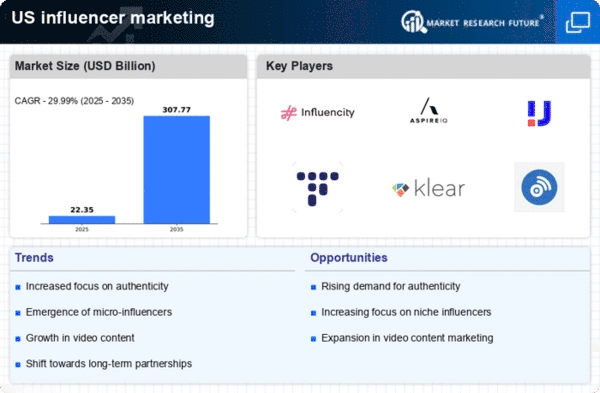The US Influencer Marketing Market has witnessed significant growth and evolution over the past few years, becoming a pivotal avenue for brands seeking effective ways to reach their target audiences. Influencer marketing is no longer just a trend but a fundamental component of digital advertising strategies. The competition within this space is intense, characterized by varied approaches ranging from micro to macro-influencers engaging diverse consumer segments across multiple platforms. Brands are increasingly leveraging data-driven methods to connect with the right influencers, ensuring that their campaigns resonate deeply with potential customers.
This market's competitive landscape is further influenced by the emergence of platforms and tools that enable better tracking, analysis, and optimization of influencer partnerships, highlighting the importance of innovation and adaptability in an ever-changing ecosystem.CreatorIQ stands out in the US Influencer Marketing Market due to its robust platform that streamlines and enhances influencer marketing efforts for brands and marketers. Its strengths lie in its advanced analytics capabilities, allowing for better campaign performance tracking and audience insights, which helps brands make informed decisions when choosing partnerships.
With a comprehensive suite of tools, CreatorIQ provides brands with the ability to identify relevant influencers effectively, manage relationships, and measure campaign success.
The platform's data-driven approach not only enhances transparency but also fosters trust among brands and influencers, enabling more authentic connections to be formed. Moreover, CreatorIQ’s strong presence in the market is bolstered by its collaboration with numerous brands across various sectors, establishing itself as a leader in optimizing influencer-driven initiatives.TikTok has emerged as a dominant force in the US Influencer Marketing Market, capitalizing on its unique algorithm and user engagement strategies to create a compelling environment for brands looking to reach a younger demographic.
The platform offers key products and services, including advertising solutions such as In-Feed ads and TopView placements, which allow brands to integrate influencer partnerships seamlessly into user experiences. TikTok's strengths lie in its ability to foster organic content creation and virality, making it an attractive platform for influencers and brands alike.
The company has also engaged in strategic partnerships and acquisitions that augment its capabilities in influencer marketing, further solidifying its market presence. By continuously developing features that enhance user engagement and offering data analytics for brands, TikTok has created a unique ecosystem where creativity thrives, empowering brands to leverage its vast network of influencers to maximize their marketing efforts in a distinctive and impactful manner.





















